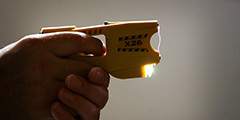Taser History
Jack Cover, a NASA researcher, began developing the Taser in 1969. By 1974, Cover had completed the device, which he named after a book featuring his childhood hero Tom Swift, Tom Swift and His Electric Rifle, by "Victor Appleton" (a house pseudonym of the Stratemeyer Syndicate).
The Taser Public Defender used gunpowder as its propellant, which led the Bureau of Alcohol, Tobacco and Firearms to classify it as a firearm in 1976. The backformed verb "to tase" is used sometimes.
Taser International CEO Patrick Smith has testified in a Taser-related lawsuit that the catalyst for the development of the device was the "shooting death of two of his high school acquaintances" by a "guy with a legally licensed gun who lost his temper". In 1993, Rick Smith and his brother Thomas began to investigate what they called "safer use of force option for citizens and law enforcement". At their Scottsdale, Arizona, facilities, the brothers worked with the "...original Taser inventor, Jack Cover" to develop a "non-firearm Taser electronic control device". The 1994 Air Taser Model 34000 had an "anti-felon identification (AFID) system" to prevent the likelihood that the device would be used by criminals; upon use, it released many small pieces of paper containing the serial number of the Taser device. The U.S. firearms regulator, the ATF, stated that the Air Taser was not a firearm.
In 1999, Taser International developed an "...ergonomically handgun-shaped device called the Advanced Taser M-series systems", which used a "...patented neuromuscular incapacitation (NMI) technology". In May 2003, Taser International released a new weapon called the Taser X26, which used "shaped pulse technology". On July 27, 2009 Taser International released a new type of Taser called the X3, which can fire three shots before reloading. It holds three new type cartridges, which are much thinner than the previous model. More details
The Taser Public Defender used gunpowder as its propellant, which led the Bureau of Alcohol, Tobacco and Firearms to classify it as a firearm in 1976. The backformed verb "to tase" is used sometimes.
Taser International CEO Patrick Smith has testified in a Taser-related lawsuit that the catalyst for the development of the device was the "shooting death of two of his high school acquaintances" by a "guy with a legally licensed gun who lost his temper". In 1993, Rick Smith and his brother Thomas began to investigate what they called "safer use of force option for citizens and law enforcement". At their Scottsdale, Arizona, facilities, the brothers worked with the "...original Taser inventor, Jack Cover" to develop a "non-firearm Taser electronic control device". The 1994 Air Taser Model 34000 had an "anti-felon identification (AFID) system" to prevent the likelihood that the device would be used by criminals; upon use, it released many small pieces of paper containing the serial number of the Taser device. The U.S. firearms regulator, the ATF, stated that the Air Taser was not a firearm.
In 1999, Taser International developed an "...ergonomically handgun-shaped device called the Advanced Taser M-series systems", which used a "...patented neuromuscular incapacitation (NMI) technology". In May 2003, Taser International released a new weapon called the Taser X26, which used "shaped pulse technology". On July 27, 2009 Taser International released a new type of Taser called the X3, which can fire three shots before reloading. It holds three new type cartridges, which are much thinner than the previous model. More details

